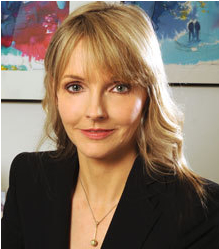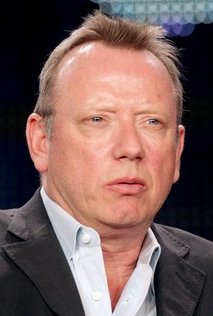CBC's Vice president Kristine Stewart and Trevor Walton, executive director of commissioned and scripted programming, English Services
tV: I'd like to ask about the facility.
TW: Its really amazing isn't it. It was originally an equestrian barn and someone was saying to me that when we first came in here that they could smell that it was once an equestrian barn.
KS: I can still smell it.
TW: It has been used for other productions but I think this is the biggest, longest running show that they've had in this space. I think it's fantastic.
tV: With your new season you have some shows moving out and others moving in.
KS: There aren't so many moving out but lots coming back and the new shows are really quite fun. As shows naturally end, this is Mosque's last season for example, it makes room for shows like Arctic Air and Mr. D. It's an exciting schedule and it's going to be one of our strongest yet.
tV: It seems that six is the magic number for a series. There are a lot of classic shows that have lasted six seasons.
KS: It might be coincidence. Trevor had more experience because he's worked at many other networks too.
TW: I think six is very good. I think we'd be very happy for Arctic Air to go six seasons. I hope it will. I think it depends very much on the material. One of the things I was saying earlier was about the decision to pick up a show and whether you want to pick it up for another season. You can feel it when you're working on the show, that it feels a fertile area. A good show is one that had lots of possibilities and potential story-lines.
KS: At one point we used to do shows for five seasons because there used to be fifteen [shows per season]. Five times thirteen was sixty-five for syndication, but that's kind of passed.
KW: We'll see. Come back in six years (all laugh).
V: Arctic Air is the new highly anticipated show. How did that get off the ground?
TW: Good pun. Very good. Kristine's the person to ask it came before my time. But like I said earlier, I'm very happy to inherit this show because it's very strong. The shows we've been seeing and the dailies look fantastic! Very high production.
KS: It's an interesting departure for us in the sense that we've been doing a lot of pilots lately, which are really helpful to us testing things out to see how everybody fits together as far as cast, writing, and direction.
This is one show that came with the package of the cast that it has, like Adam Beach, and we thought, “you know, this sounds right.” We just okayed it from that point and didn't go to pilot because we wanted it to air that much more quickly. I think it's going to be a fast-tracked show I guess you could call it. I think it's already proving that in what we're seeming to be the right choices. The teams we're working with are amazing: the producers, and the teams of talent are really delivering. We took a leap of faith and I think it's coming to fruition.
TW: And the location is really unusual. I've never seen anything quite like it before. I've seen it trickled through the storyline so that's very exciting for us as well in our design.
I keep telling this story of when I arrived at CBC. It was August and everybody was off on their summer vacation. Not one person left Canada. Everybody went off somewhere to their favourite part of Canada and I thought that that was really indicative of the pride people have of this incredible country. Yellowknife is a fantastic new location for us.
tV: As far as Canadian content goes. You have a lot of shows that have huge audiences internationally.
KS: So many of our shows are completely Canadian, like Little Mosque on the Prairie, Heartland. You can't get any more Canadian that a ranch in Calgary. It's interesting that the place the show's set isn't a restrictive part of what it is you make: it actually can be the attraction.
I'm finding that with the Republic of Doyle in St. John's or Heartland in Calgary, those settings, the cities and the towns that they're in, actually become another character in the show. Because the characters are very real and authentic, the story-lines can travel around the world because everybody falls in love, and everybody has disappointment in their lives, everybody laughs, everybody cries.
I think those human emotions translate very well to the overseas market, which is why we see so many of these shows doing so well over there. The idea of Little Mosque on the Prairie not just being about what it's like to be a Muslim in a small town, but what it's like to be a new comer with a different kind of background.
We're a country of immigrants so these stories are applicable literally, in the sense that it's a story about Muslims, but also in what it's like to be accepted and integrated. That can happen internationally so it's quite a world wide story too.
tV: Is there any part of Canada that you'd like to see explored next?
KS: I think we're always looking for great stories and they come out of these small towns. It was fascinating to me a couple of years ago when Corner Gas was number one and Little Mosque on the Prairie was a big hit. They were both coming out of Regina. Who would have thought, that out of Hollywood, New York, Paris, and London, that two major international shows were actually coming from Regina.
I think you have to leave yourself open to everywhere. We're constantly looking across the country to see who's go the best story because the story is what it's all about.
TW: Its really amazing isn't it. It was originally an equestrian barn and someone was saying to me that when we first came in here that they could smell that it was once an equestrian barn.
KS: I can still smell it.
TW: It has been used for other productions but I think this is the biggest, longest running show that they've had in this space. I think it's fantastic.
tV: With your new season you have some shows moving out and others moving in.
KS: There aren't so many moving out but lots coming back and the new shows are really quite fun. As shows naturally end, this is Mosque's last season for example, it makes room for shows like Arctic Air and Mr. D. It's an exciting schedule and it's going to be one of our strongest yet.
tV: It seems that six is the magic number for a series. There are a lot of classic shows that have lasted six seasons.
KS: It might be coincidence. Trevor had more experience because he's worked at many other networks too.
TW: I think six is very good. I think we'd be very happy for Arctic Air to go six seasons. I hope it will. I think it depends very much on the material. One of the things I was saying earlier was about the decision to pick up a show and whether you want to pick it up for another season. You can feel it when you're working on the show, that it feels a fertile area. A good show is one that had lots of possibilities and potential story-lines.
KS: At one point we used to do shows for five seasons because there used to be fifteen [shows per season]. Five times thirteen was sixty-five for syndication, but that's kind of passed.
KW: We'll see. Come back in six years (all laugh).
V: Arctic Air is the new highly anticipated show. How did that get off the ground?
TW: Good pun. Very good. Kristine's the person to ask it came before my time. But like I said earlier, I'm very happy to inherit this show because it's very strong. The shows we've been seeing and the dailies look fantastic! Very high production.
KS: It's an interesting departure for us in the sense that we've been doing a lot of pilots lately, which are really helpful to us testing things out to see how everybody fits together as far as cast, writing, and direction.
This is one show that came with the package of the cast that it has, like Adam Beach, and we thought, “you know, this sounds right.” We just okayed it from that point and didn't go to pilot because we wanted it to air that much more quickly. I think it's going to be a fast-tracked show I guess you could call it. I think it's already proving that in what we're seeming to be the right choices. The teams we're working with are amazing: the producers, and the teams of talent are really delivering. We took a leap of faith and I think it's coming to fruition.
TW: And the location is really unusual. I've never seen anything quite like it before. I've seen it trickled through the storyline so that's very exciting for us as well in our design.
I keep telling this story of when I arrived at CBC. It was August and everybody was off on their summer vacation. Not one person left Canada. Everybody went off somewhere to their favourite part of Canada and I thought that that was really indicative of the pride people have of this incredible country. Yellowknife is a fantastic new location for us.
tV: As far as Canadian content goes. You have a lot of shows that have huge audiences internationally.
KS: So many of our shows are completely Canadian, like Little Mosque on the Prairie, Heartland. You can't get any more Canadian that a ranch in Calgary. It's interesting that the place the show's set isn't a restrictive part of what it is you make: it actually can be the attraction.
I'm finding that with the Republic of Doyle in St. John's or Heartland in Calgary, those settings, the cities and the towns that they're in, actually become another character in the show. Because the characters are very real and authentic, the story-lines can travel around the world because everybody falls in love, and everybody has disappointment in their lives, everybody laughs, everybody cries.
I think those human emotions translate very well to the overseas market, which is why we see so many of these shows doing so well over there. The idea of Little Mosque on the Prairie not just being about what it's like to be a Muslim in a small town, but what it's like to be a new comer with a different kind of background.
We're a country of immigrants so these stories are applicable literally, in the sense that it's a story about Muslims, but also in what it's like to be accepted and integrated. That can happen internationally so it's quite a world wide story too.
tV: Is there any part of Canada that you'd like to see explored next?
KS: I think we're always looking for great stories and they come out of these small towns. It was fascinating to me a couple of years ago when Corner Gas was number one and Little Mosque on the Prairie was a big hit. They were both coming out of Regina. Who would have thought, that out of Hollywood, New York, Paris, and London, that two major international shows were actually coming from Regina.
I think you have to leave yourself open to everywhere. We're constantly looking across the country to see who's go the best story because the story is what it's all about.



 RSS Feed
RSS Feed
